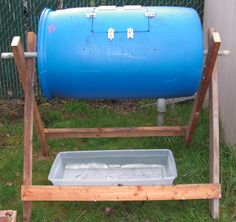
So, what is compost? Compost is organic matter that has decomposed. In a garden, decomposition is a good thing! Compost can be made from kitchen scraps, lawn clippings, newspapers, leaves wood chips, coffee grinds…almost any food products. Composting saves resources, and because of its high nutrient content, it adds to soil stability and reduces soil disease. It will help your garden grow lush and promote healthy growth in seedlings and plants. It’s for all these reasons gardeners call compost “black gold”. Composting allows you to accomplish the big environmental three: Reduce, Reuse and Recycle.
This year the focus of compost day is awareness. Knowing what it is, why and how to do it. However, I have found there are reasons NOT too compost. I’ve asked lots of friends and relatives why not: their collective rationale being it’s gross, it’s annoying, it’s inconvenient, I don’t even see what difference it will make. The difference, annoyingly enough, is that the impact of diverting the entirety of food waste in the United States from landfills is equivalent to removing 7.8 million passenger cars from the nation’s streets, according to the U.S. Composting Council. The only benefit of not composting, particularly in a city with infrastructure in place, is that it is less bothersome to you.
Wow! Now you feel kind of bad. A little selfish. It’s OK! The entirety of human action toward environmental sustainability, justice, or anything else can be boiled down to quietly eroding your own selfishness.
I have been included in this group. Sometimes you’re going through it and don’t want to deal with the little chore. And fruit flies. And kids spilling it all over before it even gets to the compost tumbler. I’m in a rush and I don’t want to want mess around with it, etc. But, I have always had a lot of motivation begin with financial savings. Have you ever paid for soil to build a good sized raised bed? Have you ever been frustrated that your plants look terrible despite the fertilizer you paid for and applied diligently? Have you ever had kids dig in your bought soil and throw it all over the yard? Have you ever paid way too much for cucumbers or tomatoes or peppers because yours aren’t thriving? Those are my motivations.
It’s free
To start your own compost pile will cost you nothing but a little effort, space, and time. Sure, you may want to invest in a tumbler (I did and it’s great!) or build a compost bin or system. Figure out the method you’d like to use to compost, and take items you may have thrown out or recycled and use them to create your compost pile! Once you’ve got the right mix of items, you only need to keep it slightly damp and turn it every once in a while and the process of decomposition will do all the work for you! Be patient and in few short weeks you can have your own black gold made from your household garbage. This is definitely a case of turning trash into treasure.
My other motivation is to show my kids the value of reusing our waste. I struggle with wanting the best for my babies and boiling with rage when they complain about wanting more stuff or saying “ew” to small steps we take to reduce our footprint. I want them to understand that we are part of a much bigger system that depends on us to do our part.
It’s environmentally friendly
By utilizing your household organic and paper trash, you reduce the amount of garbage going to our landfill. When organic waste is put in the trashcan, the trash is driven to a disposal site where it can take years to decompose because it’s been encased in a plastic bag. Using compost in your garden or on a farm also reduces the amount of dangerous commercial fertilizers used to encourage growth in crops, and conserves water by improving the stability of the soil in which you’ve planted your fruits, vegetables, flowers, and shrubbery.
Don’t get weighted down by the “rules.” Be open to learning about the process. Be open to learning what works for you. Don’t make it a chore; have fun learning about composting and your contribution to the planet!
It’s fun
There is a feeling of total satisfaction when you take something that could have been put in the garbage and transform it into a usable substance. It’s almost like magic! Also the use of compost will increase the worm population and if you have children, you know worms are, in fact, fun to watch and have wiggle in your palm! You know the worms are doing the work of aerating the soil and increasing nutrients in the dirt, but your kids just think worms are cool.
 RSS Feed
RSS Feed